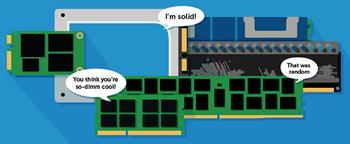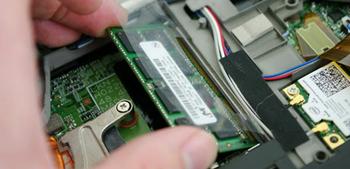A recent survey undertaken by Crucial and GMI Research concluded that many folks' confidence in being able to diagnose and solve computer problems outweighs their actual ability to do the job. It seems that men are most guilty of this overconfident, inaccurate belief in their own abilities…
As Crucial is a major computer memory supplier, it understandably decided to pitch a predicament to the PC problem finding guinea pigs with the root cause being a lack of computer memory. Despite a RAM upgrade being the only solution required to fix the computer woes observed in the study "more than 90 percent of respondents failed to identify memory as the cause of slow computer performance," says the firm, which is owned by Micron Technology.
The guinea pigs were presented with a series of "classic symptoms" describing how a PC with a lack of RAM behaves "such as slowing performance and lockups using common programs". They were asked for five possible explanations of the probable cause. The results of the survey are as follows:
- Failed component inside the computer: 36 percent
- Computer needs more drive storage: 35 percent
- Software issue, such as a recent program download or operating system update: 10 percent
- Virus or malware: 10 percent
- Insufficient memory: 8 percent
Looking deeper into the data, Crucial says over 90 per cent of both men and women failed to make a correct diagnosis of the PC problems. However, of the men surveyed nearly half of them were "either extremely or very confident that they have the knowledge to fix computer issues".
There's a lesson to be learned from the above, says Crucial Marketing Manager, Ed Walker "This new data demonstrates that while men are willing to fix computer issues and invest money for repairs, they don’t recognize a simple memory problem when they see it."
However it must be noted that being given a list of sickly-PC symptoms isn't the same as having an ailing computer in front of you. With the machine running, albeit slowly, and the screen on, I think many would have initially dived into the PC's system control panel to see what is installed in the PC and any device manager exclamation points before jumping to a 'failed component' or a 'short on drive storage' analysis of the slow and locking-up PC problems.
The survey took part this summer with the questions posed to 1001 adults aged 35-70.








